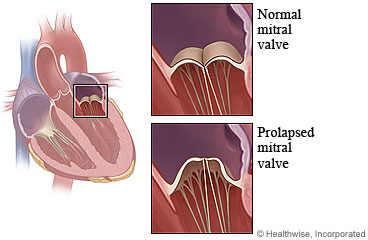Mitral Valve Prolapse: Care Instructions

Overview
Your heart is a muscular pump that has four chambers and four valves. Your mitral valve is like a one-way gate that regulates blood flow in your heart. It allows blood to flow in only one direction, from the upper to the lower heart chamber on the left side of the heart. Normally the mitral valve closes after blood flows through it. This keeps blood from leaking back into the upper chamber. In mitral valve prolapse, the flap of the valve bulges backward (prolapses) into the upper chamber.
In most cases, a prolapse does not cause a problem. This is because the seal between the two heart chambers remains tight enough to prevent a leak. Blood moves normally through the valve.
You will probably not need treatment for mitral valve prolapse. You may not have symptoms. But you have a risk for a problem called mitral valve regurgitation. With this problem, the flaps of the mitral valve do not seal tightly and blood leaks back into the upper chamber. Your doctor will likely check for signs of this problem at regular checkups.
Follow-up care is a key part of your treatment and safety. Be sure to make and go to all appointments, and call your doctor or nurse advice line (811 in most provinces and territories) if you are having problems. It's also a good idea to know your test results and keep a list of the medicines you take.
How can you care for yourself at home?
Heart-healthy lifestyle
- Do not smoke. If you need help quitting, talk to your doctor about stop-smoking programs and medicines. These can increase your chances of quitting for good.
- Eat heart-healthy foods. These foods include vegetables, fruits, nuts, beans, lean meat, fish, and whole grains. Limit sodium, alcohol, and sugar.
- Stay at a healthy weight. Lose weight if you need to.
- Manage other health problems, such as diabetes, high blood pressure, and high cholesterol. If you think you may have a problem with alcohol or drug use, talk to your doctor.
- Get vaccinated against COVID-19, influenza (flu), and pneumonia.
 Activity
Activity
- Be active. If you have not been active before, talk with your doctor before starting an exercise program. Try for 2½ hours of activity a week. Walking is a good choice. You also may want to do other activities, such as running swimming, cycling, or playing tennis or team sports.
When should you call for help?
Call your doctor or nurse advice line now or seek immediate medical care if:
- You have new or increased shortness of breath.
Watch closely for changes in your health, and be sure to contact your doctor or nurse advice line if you are not getting better as expected.
Where can you learn more?
Go to https://www.healthwise.net/patientEd
Enter V423 in the search box to learn more about "Mitral Valve Prolapse: Care Instructions".
Current as of: July 31, 2024
